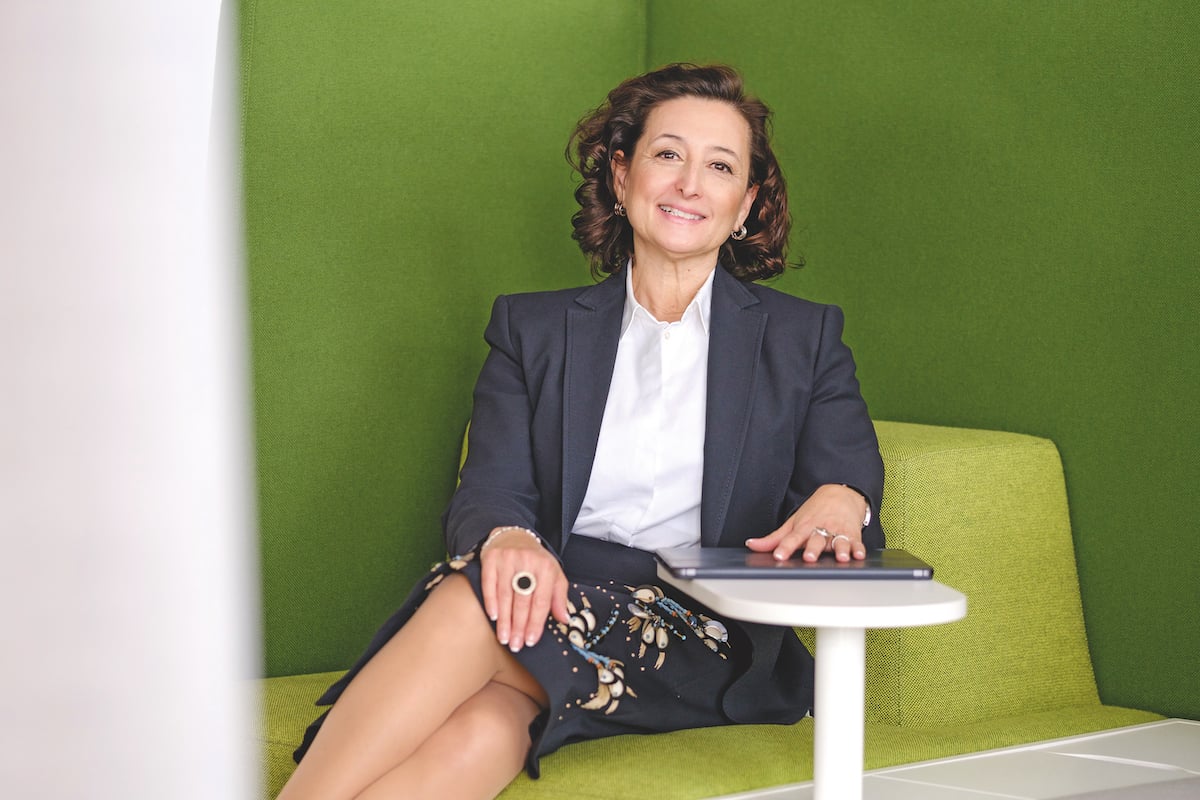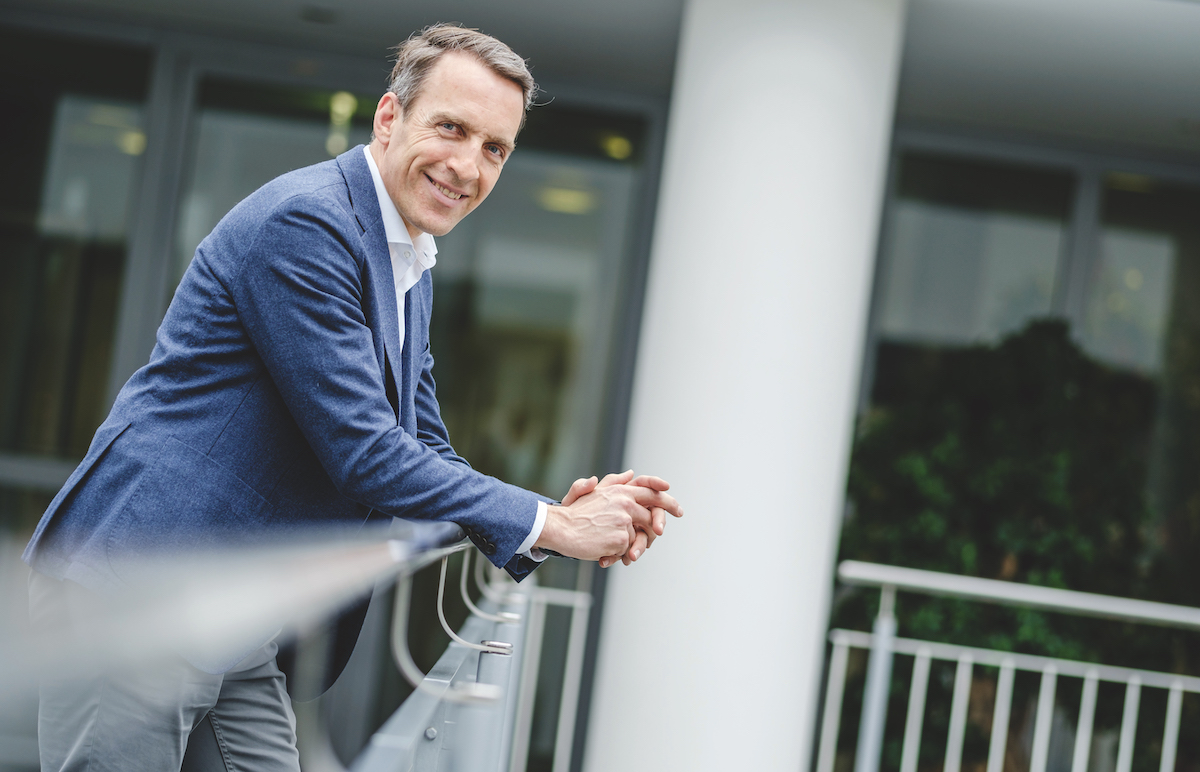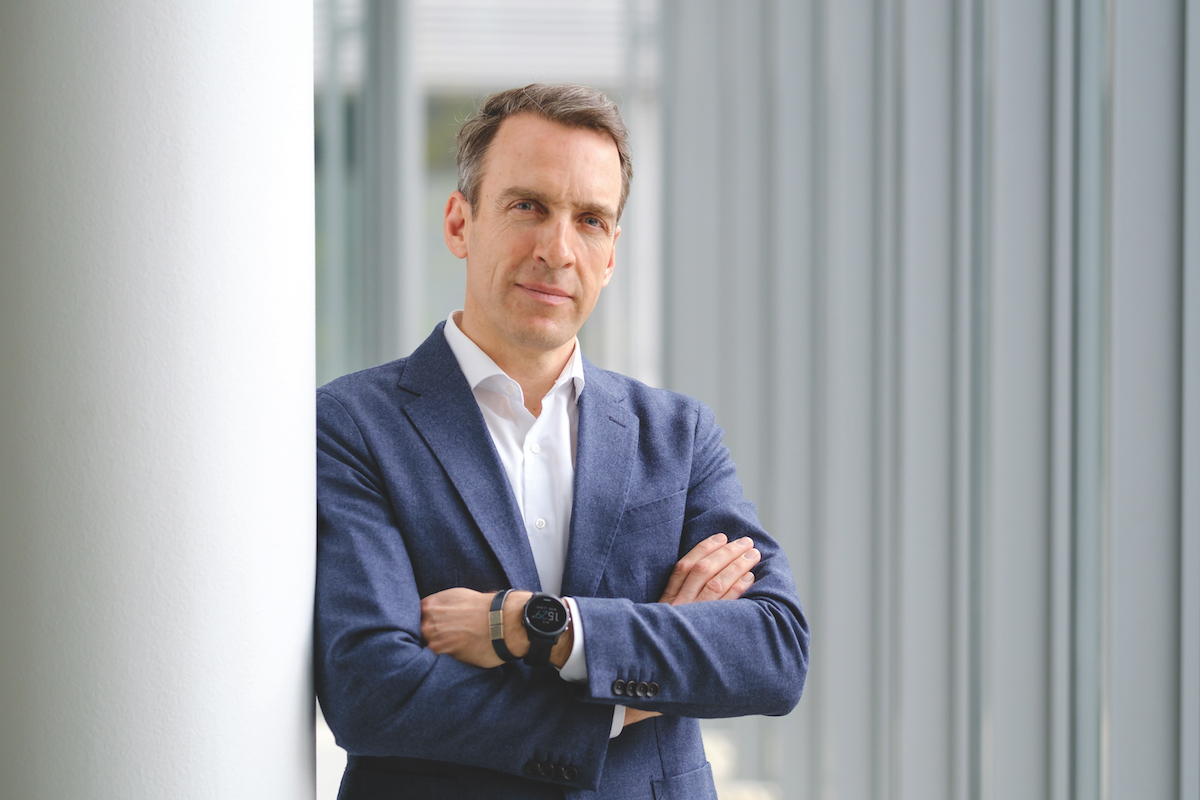Thriving Under Pressure: Elena Ordonez del Campo & Christian Till Roga
From carbon-slashing innovations at airports to Germany’s COVID-19 app, T-Systems is playing a key role in digitalising the world. But its leadership team, including Elena Ordonez del Campo and Christian Till Roga, knows that cutting-edge tech is only as valuable as the business processes behind it.
Elena Ordonez del Campo thrives under pressure. Looking back on her career, it is the down-to-the-wire "mission impossible" projects that she recalls most fondly. As Senior Vice President SAP Solutions, an end-to-end digital services company, she has had more of these experiences than she can count.

"These are always the most satisfying ones because you know the way is going to be very hard. You’re going to fail a couple of times," Elena says. "You need to stand up and roll up your sleeves and work together with a team. They are hard but, at the end of the day, these are the projects where, when I tell my team about them, I always have a smile on my face because of the rewards after the hard work."

Few projects were more challenging than the one T-Systems worked on for the German government last year to develop the Corona-Warn-App, a track-and-trace system that alerts people if they have had contact with someone with COVID-19 in order to break chains of infection.
The company, working with SAP and its parent company Deutsche Telekom, had just 50 days to roll out the app, which was developed in open-source mode, meaning anyone was free to view the code and participate in its development. It was the largest open-source project ever implemented for the German government.
The pandemic had only just begun, and the stakes were very high. "It had to be delivered on time. It was risky because everyone was watching us, but we did it," Elena reveals.
The app was wildly successful, with around 30 million downloads. Thanks to this success, T-Systems has been commissioned to work on other projects that are similarly challenging and complex, including one for the European Union. "This is a new way of working, with very diverse teams and an agile approach to environments," she says. "This is the new way and also what our customers require."

These projects are also perfect examples of how the COVID-19 crisis has accelerated digitalisation. "I really believe that the speed of innovation has increased faster than ever before, and in the future, that’s the new reality we need to chase," Elena predicts. "The pandemic has accelerated the path of innovation."
Shifting focus
T-Systems is often seen as a legacy IT provider, according to Christian Till Roga, Senior Vice President Global Portfolio Excellence. But as the Corona-Warn-App and many other projects show, that isn’t actually the case. "We’re really ensuring that we have shifted the focus much more to an industry-specific one, to make sure we leverage our broad portfolio and align them more to our clients’ needs to deliver value," he explains.
"They are hard but, at the end of the day, these are the projects where, when I tell my team about them, I always have a smile on my face because you have the rewards after the hard work."
"We’re probably being viewed more for our technical capabilities, cloud services, security and connectivity," Elena adds. "We have a very big team of professionals working on how business process digitalisation can bring us to the next level. But this is not so well-known in the market."
Elena finds it more helpful to view what T-Systems does as offering solutions, rather than simply giving access to better technology. "Technology only brings value if there is business planning behind it in the way it’s used," she says.
T-Systems is working on cloud solutions for industries that are traditionally concrete, such as automotive, and Elena sees high growth potential in these technologies because when clients invest in them, they join the company’s journey. "Technology is maybe the wrong word; it’s really solutions, because at the end of the day, we need to provide that business value to the customers," she says. "This is a journey that we need to take together with partners and customers."
To maintain its holistic focus, the primary target of investment is people, Christian explains. "We invest more into the areas where it’s about skills – that’s the number one investment that we make – and we repeatedly do this innovation cycle, which in my view always pays off. Investing in people always pays off," he insists.
With a firm base of skills in place, T-Systems can confidently invest in specific technological areas. At the moment, Christian is overseeing investments in artificial intelligence and blockchain technology, among others. "Customers can see how we help them, out of the ocean of possibilities that are out there, by selecting the right elements and understanding how to best use these elements with the right skills," he reveals.
End-to-end solutions
The company’s vision is to be the most reliable provider of information and communication technology solutions by leveraging cutting-edge technologies and industry expertise in business processes.
The first asset that is vital to the company’s vision is knowledge of cloud services in a multi-cloud environment. "Whether it is a private cloud or public clouds, we’re running everything together as well as offering connectivity and telecoms," Elena shares.
The second asset is the ability to leverage technology in order to evolve the business processes of T-Systems’ customers and even set up new business models and new business opportunities as new technologies emerge. This requires integrating the Internet of Things, artificial intelligence, blockchain and other technologies to develop new processes and new business models.
"I really believe the unique selling proposition of T-Systems is the fact that we do this in a secure environment," Elena reflects. "For data privacy and security, especially in Germany, there are very high standards, the highest in Europe and probably worldwide. That’s why the European Union took those standards. So it’s a package, two sides of the coin, to bring one end-to-end solution to our customers."
"Trusted, secure, independent, German, end-to-end," Christian says, offering his summary of T-Systems’ unique selling points. "That is something you don’t have with any other competitor."
The challenge now, he says, is bringing those portfolio offerings to life. "This company has a strong client base. We’re known for solid, stable, secure, independent IT operations. We know our clients very well, we run their IT," he states. "But let’s be honest, this is only less than half of our business. If you look at T-Systems, a significant part of the portfolio is the 5,000 highly skilled application people, security, advisory and others."
He believes the biggest challenge the company faces is combining these different portfolio elements to better serve clients in moving towards digitalisation.
"We’ve got these ingredients, but so far we have not yet really unleashed this potential," he says.
To do so, T-Systems has grouped these different assets and capabilities by industry, giving clients a more industry-specific view and supporting them across the breadth of the whole portfolio.
Another challenge the two leaders are facing is in ensuring that all staff are kept up to date with the latest advances in technology. "Learning is a lifelong journey," "There are new technologies out there, and we need to keep the skills of our people up to date," Elena explains.
"We work with a lot of partners – Hyperscalers, Microsoft, Amazon Web Services, Google Cloud Platform, to mention a few – and obviously we need to keep the skills of our teams sharp so that we can deliver on our promise to our customers. We want to help them to evolve their business in the new digital age and bring business value to them today based on the knowledge that we have in different industries."
Footprint reduction
While tackling these challenges, Christian is also leading the company’s efforts to become more sustainable. The goal is to bring the company’s Scope 1 and Scope 2 emissions down to net zero by 2025, and to bring value chain emissions down to net zero by 2040.
"We take ownership of our own emissions," he asserts. "We’ve already switched to green energy for all locations, including data centres worldwide. So we’re focusing on our own operations and leveraging all the levers we have in this regard. This is already part of the standard, or at least it should be the standard, for all the companies that are out there."
However, T-Systems wants to go even further than the standard, so it is taking an even broader view of its environmental footprint. "The second area we focus on is really taking responsibility to enable our clients to change their environmental footprints. IT has got significant potential, but it comes with a significant potential cost as well in terms of how much energy it uses," Christian says.
"Customers can see how we help them, out of the ocean of possibilities that are out there, by selecting the right elements and understanding how to best use these elements with the right skills."
T-Systems offers baseline consulting services to clients to help them reduce their environmental footprints, using real-time data to show cloud users how much energy they consume. The company offers advice to clients on changing their business models and reducing energy consumption from travel and other basic processes. "We are really multiplying our impact by supporting clients," he states proudly. "We’ve got dedicated offerings in this area."
T-Systems’ Airport Collaborative Decision Making service enables air traffic controllers to coordinate better with baggage handlers and other ground staff in order to reduce delays, which in turn significantly reduces fuel consumption, saving about 92 kilograms of CO 2 per departure. "You can imagine, if you multiply this into a global scale, there’s a significant footprint reduction," Christian reveals.
Another T-Systems project uses augmented reality glasses to enable remote support for maintenance and repair work. The pilot project is a partnership with Schwan Cosmetics and Microsoft HoloLens. The project has not only reduced service costs and machine downtime, but also cut the amount of travel needed for maintenance.
Such offerings usually arise out of a particular need from a client, and then are taken up by other customers when the sustainability and other benefits become apparent. "We don’t usually create them in a blank space," Christian points out. "There is already demand out there, and then they multiply to other customers, especially the general advisory and the real-time understanding of IT usage. They are really popular in the market right now."
Clients are also expressing more interest in a range of other areas to bolster their corporate social responsibility credentials. "The commitment of different companies and providers to sustainability, and also to things like diversity and human capital index, is going to play a bigger role in the decision-making of a lot of our customers," Elena predicts.
"Technology only brings value if there is business planning behind it in the way you use it."
"I think it’s also very important if you want to attract young talent to the organisation. There are certain things they stand for, and there’s something they’re looking for. When they hunt for a new job opportunity, they have a purpose and want to see if you can fulfil it."
For Elena, pursuing diversity is not just the right thing to do, it makes good business sense. "When we talk about diversity, there are so many different dimensions," she says. "It’s not just gender diversity, it’s about gender, age, culture, background, and sexual and religious orientation. This is a topic that’s important to us. We are positioning that within the organisation and looking at how many opportunities we give to people from different backgrounds."
Elena adds that there are numerous studies showing why diverse teams work better. "Companies that have diverse leadership teams get around 45% revenue coming out of new innovation streams," she shares. "Companies with diverse teams make better decisions 87% of the time versus 58%. If you have diverse teams, they challenge the status quo because you have brains that are thinking differently and therefore question what it is you have been doing lately. We know how important innovation is for companies to survive and to speed up in the digital world.
"So it’s important to us not only because we believe in the topic, but also because there’s data and studies showing it leads to better outputs."
In such a fast-moving industry, and amid a pandemic, Elena recognises the importance of embracing change in a crisis. "COVID-19 showed us that change is part of life," she says. "We need to forge new ways, new technologies and ask what does this change mean for us moving forward? There’s always an opportunity behind that question."